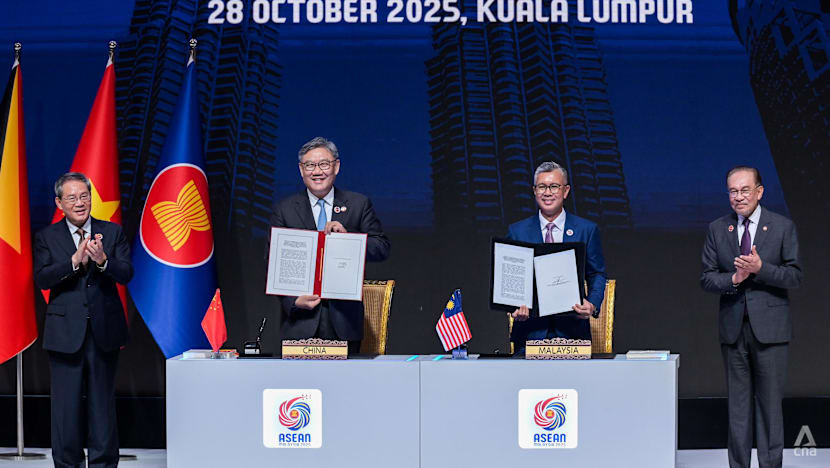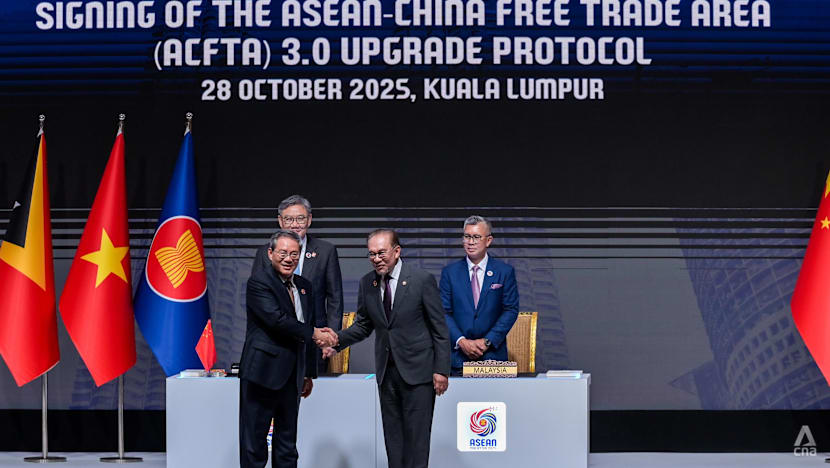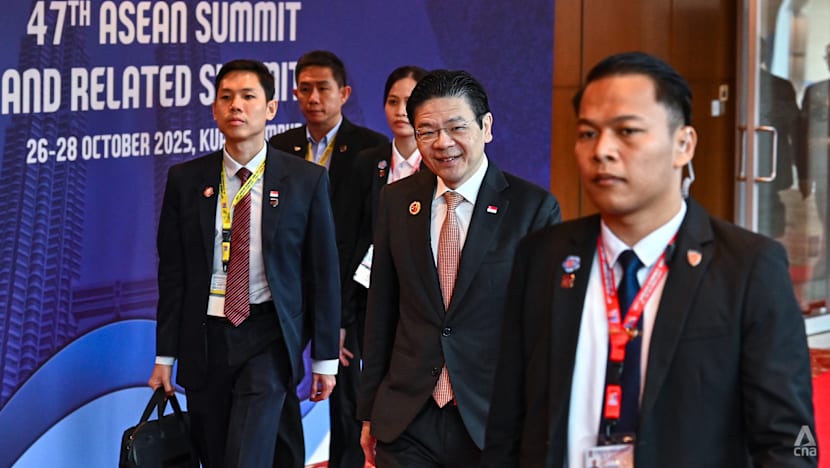China, ASEAN ink upgraded free trade pact covering digital, green economies, supply chain connectivity
The ASEAN-China Free Trade Area (ACFTA) 3.0 Upgrade Protocol was signed on the third and last day of the 47th ASEAN Summit held in Kuala Lumpur.

The signing of the ASEAN-China Free Trade Area (ACFTA) 3.0 Upgrade Protocol between China Commerce Minister Wang Wengtao and Malaysia Investment, Trade and Industry Minister Tengku Zafrul Abdul Aziz as witnessed by China Premier Li Qiang and Malaysia Prime Minister Anwar Ibrahim during the 47th ASEAN Summit in Kuala Lumpur on Oct 28, 2025. (Photo: CNA/Fadza Ishak)

This audio is generated by an AI tool.
KUALA LUMPUR: China and the Association of Southeast Asian Nations (ASEAN) on Tuesday (Oct 28) formally signed an enhanced trade deal, as both sides seek to boost ties amid global uncertainties and trade tensions with the United States.
It’s the second upgrade of the ASEAN-China Free Trade Area (ACFTA) that was first inked in 2002 - making it then China’s first free trade agreement and ASEAN’s first with a major external partner. It then came into effect in 2010, with negotiations for the first upgrade starting in September 2014 and coming into force in 2019.
The so-called 3.0 version covers areas such as the digital and green economies as well as supply chain connectivity, among others, with Beijing previously touting the agreement as a pathfinder for improved market access in sectors such as agriculture, the digital economy and pharmaceuticals between China and ASEAN.
The deal was signed by China’s Minister of Commerce Wang Wentao and Malaysia's Investment, Trade and Industry Minister Tengku Zafrul Abdul Aziz, while flanked by Chinese Premier Li Qiang and Malaysian Prime Minister Anwar Ibrahim.
Malaysia is the current rotating chair of ASEAN, which is made up of 11 members, including newly inducted Timor-Leste.
During his opening remarks at the ASEAN-China summit following the signing, Anwar said that the upgraded deal marked an important step in economic cooperation between the two sides.
“I thank my colleagues again in ASEAN and China for this spectacular feat in terms of the FTA as the first ASEAN-China FTA,” he said.
At the same summit, Li said the deal “heralds a new opportunity to expand and enhance bilateral economic and trade cooperation”.
He added that China and ASEAN were “good neighbours and brothers” who “share close ties, are interconnected, and interdependent”.
“As long as we unite and strengthen ourselves, we can unleash shockingly massive energy and overcome any challenge,” he said.

While Li heralded the upgraded trade deal that was signed moments earlier, he stressed that there was a need to pay attention to the new developments in the international landscape.
He warned that unilateralism and protectionism are impacting the international economic and trade order, with external interference in the region on the rise.
While Li did not name any countries, his comments appear to be a veiled reference to the US.
“Many countries are slapped with unwarranted high tariffs,” he added.
“Development today faces greater risks and challenges. In the face of power politics and economic bullying, we will gain nothing from disunity and confrontation, and we will only end up being divided and conquered by external forces,” he said, reiterating similar points he had made during the course of the three-day ASEAN summit.
“The more challenging the situation, the more resolute we should be in maintaining unity and self-reliance. We must defend our legitimate rights and interests through mutual support and coordinated action,” said Li.
TRADE BETWEEN CHINA AND ASEAN
China has been ASEAN’s largest trading partner for 16 consecutive years, according to Chinese customs data. In the first three quarters of 2025, China's trade with ASEAN totalled 5.57 trillion yuan (US$783.3 billion), up 9.6 per cent year-on-year.
ASEAN is the fifth-largest economy in the world with a combined gross domestic product (GDP) of US$3.9 trillion and is also China's largest trading partner, with bilateral trade totalling US$771 billion last year, according to ASEAN statistics.
The deal also comes amid efforts by Beijing to position itself as a champion of free trade and open economy, despite criticisms over its export restrictions on rare earths and other critical minerals.
Negotiations for the deal began in November 2022, and concluded in May of this year.
ACFTA 3.0 will "promote the deep integration of the production and supply chains of both sides", China's commerce ministry had said in a statement in May, when it announced the completion of negotiations.
The upgraded pact will also “inject greater certainty into regional and global trade and play a leading and exemplary role for countries to adhere to openness, inclusiveness and win-win cooperation”, the ministry had said then.
The modernised pact aims to bolster supply chain resilience and empower regional micro, small, and medium enterprises.
Analysts previously told CNA that ACFTA 3.0 is a “much-needed upgrade” that builds long-term resilience and enhances economic integration, though some caution about the need for Southeast Asia to tread carefully in managing concerns over Chinese industrial overcapacity spilling into the region.
The signing of the deal comes as the US and China look to avert an escalation of their trade war after US President Donald Trump threatened new 100 per cent tariffs on Chinese goods and other trade curbs starting on Nov 1, in retaliation for China's expanded export controls on rare earth magnets and minerals.
Beijing and Washington rolled back most of their triple-digit tariffs on each other's goods under a trade truce, which is due to expire on Nov 10.
Various reports on Sunday said that Chinese and US economic officials have agreed on the framework for a trade agreement as Trump said he was confident of hashing out a deal with Chinese President Xi Jinping when they meet in the coming days.
Trump kicked off his trip to Asia in Kuala Lumpur by inking trade deals with four Southeast Asian countries - Malaysia, Cambodia, Thailand and Vietnam - amid tariffs on US exports he has imposed on the region.
ASEAN members have also been hit with higher trade tariffs by the US.
In his speech at the ASEAN-China Summit that was held after the signing of the upgraded ACFTA, Anwar said that ASEAN’s engagement with all sides demonstrated the bloc's centrality.
“If people are curious, the day before we were with (US) President Donald Trump, and today we are back with China.
“That reflects ASEAN’s centrality, and I commend and congratulate my colleagues from ASEAN for the wisdom to maintain centrality and maintain friendly relations with all countries. This is what we consider steady engagement that fosters trust that enables us to work through challenges together.
“Complete uniformity of views is neither possible nor desirable but I believe this appreciation for China’s consistent and constructive engagement is shared by all,” he said.

Separately, Singapore Prime Minister Lawrence Wong at the ASEAN-China Summit called on leaders from the bloc and the superpower to move “swiftly” to ratify the upgraded free trade agreement so that firms and citizens will be able to reap its benefits.
He added that the effective implementation of the deal would unlock new economic opportunities across the region.
“I am confident that if ASEAN and China continue to redouble our efforts on cooperation, we can continue to drive sustainable and inclusive growth in our region and deliver lasting benefits to all our peoples.”
In a statement released after the signing of the upgraded deal, Singapore's Ministry of Trade and Industry said that it provides businesses new opportunities in key emerging areas such as the digital economy, green economy, and supply chain connectivity "to help businesses operating in Southeast Asia and China capture new opportunities such as in artificial intelligence and fintech".
"It also introduces new commitments against unfair or anti-competitive business practices and to provide better protection for online and overseas consumers," the ministry said.
Separately, the Philippines Presidential Communications Office in a statement said that the ceremony marked a significant milestone in ASEAN-China economic cooperation, with the deal reflecting the shared commitment of both sides to deepen regional integration.






















